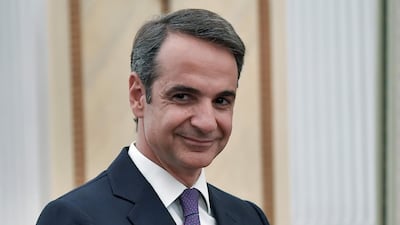Following a landslide victory, Greece’s new prime minister was sworn in on Monday as many hope his win will signal an end to austerity.
After being dogged by financial crises for years, the Greek electorate are hoping Kyriakos Mitsotakis’s centre-right New Democracy party will bring a new dawn to the nation.
With youth unemployment nearly double the EU average, the new premier will have an uphill struggle to turnaround Greece’s fortunes.
There will be no honeymoon period for him as EU leaders were due to meet on Monday to review how Greece risks missing its budget targets after his predecessor’s spending spree.
Mr Mitsotakis vowed on Sunday that his party would be “rolling up its sleeves" and that parliament won’t close for summer “because the future cannot wait."
He will now be under the international spotlight as many hope he can meet his election promises of lower taxes, jobs and investment.
In his first address as the country’s new leader, the 51-year-old Harvard-educated former banker said he welcomed the result with a sense of “modesty and respect” seeing it as a victory for all, irrespective of political persuasion.
"I assume the governance of the country with full awareness of the national responsibility," Mr Mitsotakis said in his victory speech.
"I know of the difficulties that lie ahead for me and for my associates. But I draw strength from the strength of the people."
The results of the election were announced on Sunday as prime minister Alexis Tsipras’s left wing Syriza party was toppled.
They had led the country since 2015 but despite promises things would change under their leadership the nation was forced to take a third bail out loan.
In an emotional speech, he said: "Today for us, for me, for Syriza, a large and difficult circle comes to a close. We will collectively evaluate with sobriety, the right (things) and the wrong mistakes we made, and we will not refuse, I personally will not refuse, as always, to accept the responsibilities that are mine."
The country’s interior ministry said the conservatives had gained 39.7 per cent compared with 31.5 per cent for Syriza, but the snap election saw just over half of the nation turnout to vote.
The win sees Mr Mitsotakis's New Democracy party have 158 seats in the 300-member parliament, a comfortable governing majority.
Europe's finance ministers are meeting in Brussels on Monday and will be discussing Greece, which still has stringent fiscal targets to meet even though it no longer directly receives bailout loans.
Greece's economy shrank by a quarter and poverty and unemployment levels soared during the country's nearly decade-long financial crisis.
Although its finances are on the mend and the economy is expected to grow by 2.2 per cent this year, it still has a long way to go to make up the economic output lost.
The country's debt stands at about 181 per cent of annual GDP and Greece has pledged to continue producing large primary surpluses — the budget excluding debt servicing — of more than 3 per cent of GDP for years to come.
Mr Mitsotakis has pledged to stick to his campaign pledges of lowering taxes, attracting investments and cutting through red tape to make Greece more business-friendly.
"New Democracy's clear victory in Greece's parliamentary elections will be welcomed by investors," said economics consultancy Capital Economics in a research note.
"But it will not be a game changer for the economy, not least because the government will still be constrained by its membership of the single currency and its 'surveillance' agreement with the EU."
That caution was evident in the performance of the main stock market in Athens, which was down 1.4 per cent in midday trading on Monday.
Mr Mitsotakis will also have to contend with pension increases and other benefits the outgoing government granted ahead of European elections in May — benefits which European creditors had warned could make Greece's fiscal targets hard to meet.
"Although Greece exited its third bailout in mid-2018, it is subject to 'enhanced surveillance' which bears a striking resemblance to a bail-out program," Capital Economics said.
"For example, the government will get further relief on the cost of servicing its public debt only if it sticks to tight fiscal policy."
Mr Mitsotakis was expected to name his cabinet on Monday and the ministers will be sworn in on Tuesday.


